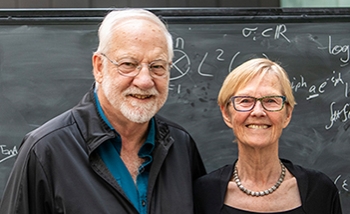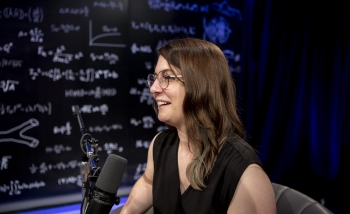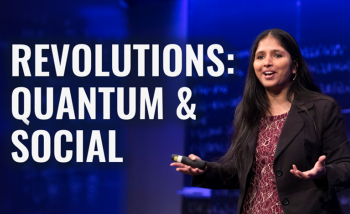When former Director Neil Turok first arrived at Perimeter Institute in 2009, he was struck by something immediately. “Where are the students?” he asked.
As a hub for some of the brightest minds in theoretical physics, Perimeter was well positioned to train the next generation of scientists. What’s more, the flow of information and growth isn’t a one-way street. “Young people are the source of renewal, new ideas, and energy — in everything, and especially in physics,” Turok said.
Six weeks (and much frantic preparation) later, the Perimeter Scholars International (PSI) master’s program was born. On June 21 this year, the program graduated its 10th cohort of budding theoretical physicists.
Several of the researchers involved in founding PSI were present at the ceremony, which was held in the Mike Lazaridis Theatre of Ideas at Perimeter, to reflect on 10 years of the program.
“When I started at PSI, the Higgs boson hadn’t been discovered, gravitational waves hadn’t been seen, and black holes hadn’t been imaged,” said Ruth Gregory, a professor of physics at Durham University, as she reflected on her experience as one of the first PSI instructors. “It’s been a joy to share this evolving state of the art.”
John Berlinsky, a professor emeritus at McMaster University and the former Academic Programs director at Perimeter, remarked on how PSI has stayed true to its founding roots. “PSI was to be a new kind of school, built on a small number of principles,” he said.
The formula was simple, yet powerful: recruit outstanding physics students from around the world; be deliberate in selecting for diversity; offer courses taught by world-class physicists; and place a focus on cooperation over competition.
Anecdotally, Berlinsky noted that graduates seemed to flourish, both in and out of the academic world. “I seem to encounter one PSI grad at every physics department I visit,” he said.
The program is broad, introducing students to leading research across theoretical physics and equipping them with the tools, skills, and mindsets needed to succeed in the field. After completing several condensed courses on a variety of topics, students then work with senior scientists on a research essay project.
For 2019 graduate Sam Cree, the structure of PSI hit the bullseye. “For someone like me, who had a lot of doubts about what field I want to go into, it’s been really great to get a taste of lots of different areas. It’s not enough to become an expert in any of those fields, of course — but I feel like I can at least speak the language of most subjects now,” Cree said.
“It’s been an overwhelmingly positive thing. I definitely recommend it to anyone, especially if they, like me, are indecisive or very curious about lots of different parts of physics. It’s a great way to sample the buffet of possible topics.”
This year’s class of 30 students (chosen from a pool of more than 550 applicants) hailed from 23 countries. The group formed deep bonds over the 10-month program. They worked together on problem sets well into the night, cooked group meals, played board games, and explored Waterloo and beyond.
When asked about their favourite PSI experience, the answer is nearly unanimous: Winter School. Now a PSI staple, each February the students are whisked off for a week to a remote rural Ontario location. Working in groups, they tackle contemporary problems in physics. Hours of intense research are punctuated by often equally intense forays into winter sports like skating, ice hockey, and tobogganing.
“It was the best week. I think I’ve never been as happy doing research,” said Nastasia Makki, one of this year’s grads. “The nice thing is that I had my supervisor there, and work went really fast. It was super efficient. That was a great feeling.”
The students are guided through their courses by PSI Fellows, academic staff who teach and mentor while also conducting their own independent academic research. Lauren Hayward Sierens is one of the PSI Fellows. She came to Perimeter initially as part of the 2011 PSI class and followed her master’s with a PhD at Perimeter.
At the graduation ceremony, Hayward Sierens recalled Neil Turok’s advice on her first day of PSI in 2011: “Stop worrying about grades. Talk to each other.”
Simple as it was, it had been transformative. “Prior to these words, I had a perception that the best and most impressive science was done alone, without asking for help from your colleagues. Because of this advice, I began to ask questions of other students. By the end of the program, I had learned as much from them as I had from my teachers,” Hayward Sierens said.
Now, as a teacher and a researcher, she continues to benefit from this advice. “Collaboration is one of the most essential tools that a researcher has,” she said.
For student Ruochen Ma, the collaborative nature of science can lead to not only deeper intellectual understanding, but personal insight as well. “The best memory for me is after I interact with my fellow students, and I can have a chance to interact with myself, then suddenly I know myself better,” he said. “That’s the beautiful moment of this year.”
As the elected student representative for the class, Ma gave a closing speech at the ceremony. “Our mutual support made this intensive year full of hope and joy,” he remarked. “Cultural collisions broaden our horizons and let us know better about ourselves.”
Though many of the students were relieved that the intense program was drawing to a close, their deep bonds made the ending bittersweet. Ma urged his classmates to keep hold of their passions and to follow them where they might lead. After all, he said, “Farewell is also the start of a colourful new adventure.”
Further exploration
About PI
Perimeter Institute is the world’s largest research hub devoted to theoretical physics. The independent Institute was founded in 1999 to foster breakthroughs in the fundamental understanding of our universe, from the smallest particles to the entire cosmos. Research at Perimeter is motivated by the understanding that fundamental science advances human knowledge and catalyzes innovation, and that today’s theoretical physics is tomorrow’s technology. Located in the Region of Waterloo, the not-for-profit Institute is a unique public-private endeavour, including the Governments of Ontario and Canada, that enables cutting-edge research, trains the next generation of scientific pioneers, and shares the power of physics through award-winning educational outreach and public engagement.
You might be interested in



